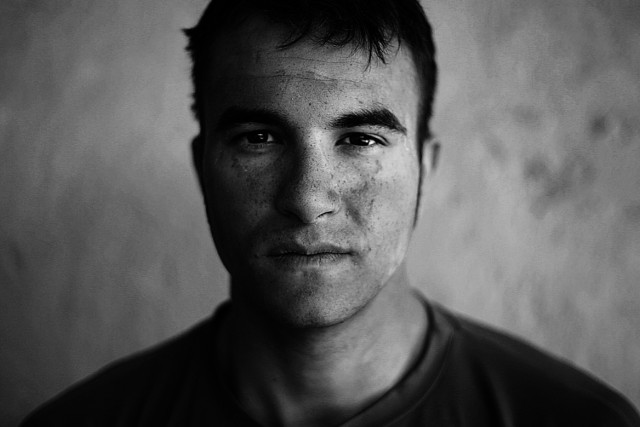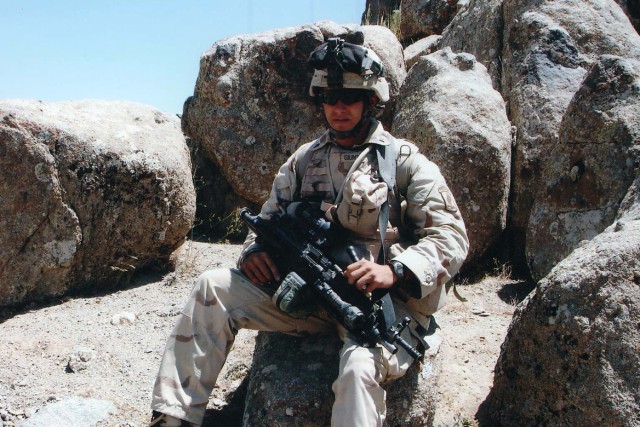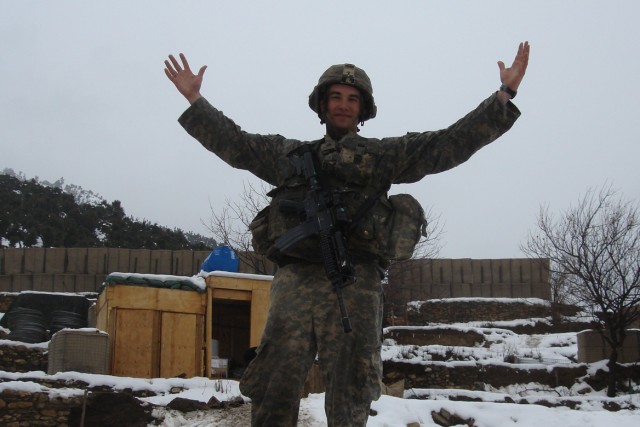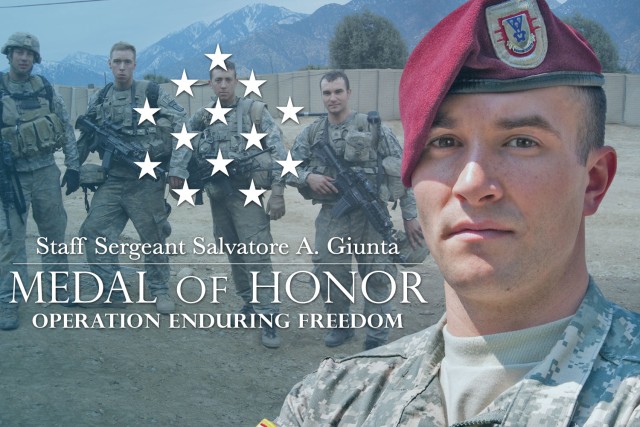WASHINGTON (Army News Service, Nov. 15, 2010) -- Don't call Staff Sgt. Salvatore "Sal" Giunta a hero.
Don't say that he went above the call of duty when he single-handedly stopped two terrorists from kidnapping his wounded buddy during a ferocious firefight in Afghanistan in 2007.
Because as Giunta sees it, he was just doing his job. He didn't do anything that any other paratrooper in 1st Platoon, Battle Company, 173rd Airborne Brigade Combat Team -- or anyone in the United States military for that matter -- wouldn't have done, and he can't quite understand what all the fuss is about.
He certainly doesn't think he deserves the Medal of Honor, which President Barack Obama presented to Giunta in a White House ceremony Tuesday afternoon -- making the seven-year Army veteran the first non-posthumous recipient of the medal since Vietnam.
"This could be any of us," Giunta said of receiving the nation's highest award for valor. "Right now, the Medal of Honor, I'm the one sitting here, but it could be any one of my buddies. It could be anyone in any of the services who are out there doing it every day.
"As for someone calling me a hero, I try not to think about it. I let the words fall away. It seems strange."
'I do solemnly swear....'
Giunta, now 25, visited an Army recruiter while working at a Subway in his native Iowa in 2003, after a radio commercial promised free T-shirts to anyone who came by.
"I like free T-shirts," he joked. "They've got to give you the spiel. That's how they give you the free T-shirt and kind of over the course of a couple days, (I) started really thinking about what the recruiter had said. We are a nation at war and and I am 18 and I am an able-bodied male." He went back, found out he could jump out of helicopters, and he was hooked.
Before he knew it, Giunta was on his way -- pumped -- to southern Afghanistan with the 173rd in March of 2005. He was excited to put his training to use and see some action, but quickly realized that war wasn't a game, that friends got hurt, or they went away and didn't come back.
After coming home at 19, he had tasted his own mortality and didn't like it. Giunta was ready to get out, perhaps get an education and spend time with his girlfriend Jennifer. But like many other Soldiers, including five others from 1st Platoon, Giunta was stop-lossed. The only place he was going was back to Afghanistan.

Valley of Death
Now a specialist, Giunta arrived in Afghanistan's remote Korengal Valley in June 2007. Near the Pakistan border, it is a smuggling route for weapons and insurgents, and one of the most dangerous areas of the country. Dubbed the 'Valley of Death,' the 10-mile-long valley has seen some of the fiercest fighting of the war and been home to dozens of American casualties. (U.S. and NATO forces withdrew from the Korengal in April 2010.)
"When we got off the helicopter, it didn't look like any Afghanistan I had ever seen before," Giunta remembered. "The mountains were hard and sharp, and also really, really steep. They had a lot of foliage. I think the trees were some sort of holly tree, so the wood was hard, the leaves were sharp."
The steep terrain and high altitude, he added, would often turn a walk of a few kilometers into a march lasting six to eight hours, especially in the beginning of the deployment.
For the next 15 months, home would be tiny Korengal Outpost and a series of smaller primitive bases, like 1st Platoon's Firebase Vegas, which the men expanded from a couple buildings into bunkers and sleeping quarters made of plywood, sandbags and Hesco barriers. They never had running water, but were able to get electricity after a few months.
The Soldiers spent much of the summer in multiple firefights a day with an enemy who might hide in mountain caves one day, and in village houses with human shields the next. It was constant, unrelenting stress that Giunta said the men dealt with by leaning on each other and laughing at things that wouldn't be funny anywhere but a remote mountaintop in Afghanistan.
Operation Rock Avalanche
On Oct. 19, the men of Battle Company were dropped deep into insurgent territory, on a mission to not only look for weapons caches, but also to win a few hearts and minds. Firefights were to be expected, Giunta said, "but if you get shot at every day, how much worse can it get'"
A lot, it turned out, but no one could have predicted the intensity of bombings and fighting that followed, including a fierce battle that left several 2nd Platoon Soldiers injured or dead.
When what remained of 2nd Platoon entered the village of Landigal on Oct. 27 to look for weapons, Giunta and the rest of 1st Platoon were assigned an overwatch position, guarding the high ground on Honcho Hill. Radio chatter indicated insurgents were out for more American blood, but, as Giunta explained, radio chatter always indicated that insurgents were out for American blood.
"This is why we're there," he said. "Let's help (the Afghan people) when we can and if (insurgents) attack us, perfect. Now we can shoot back."
They didn't expect a trap, he added, or they would have taken a different route back to the KOP when 1st Platoon began walking single file down the narrow crest of the steep Gatigal Spur shortly after sunset.

Ambush
The men didn't make it far, only 350 or 400 meters, before a hail of AK-47, PKM and RPG fire from around 15 meters away stopped them cold. About 15-20 enemy fighters had lain in wait behind a crest in the hill and parallel to the trail in a devastating "L-shaped" ambush that cut Giunta's squad off from the rest of the platoon.
Sgt. Joshua Brennan, who had been walking point, and Spc. Franklin Eckrode were wounded and separated from the rest of the men, who desperately tried to get to them, returning fire with M4s, SAW automatic weapons and grenades. Apaches watched from the sky, but the fighting was too close for the pilots to separate friend from foe and launch the ordnance that would have finished the attack.
"Every single man next to me did exactly what he could, which was get down and return fire," Giunta said of the Soldiers' response. "There wasn't really much cover, so you've got to take the fight back to them. The more rounds you shoot at them, hopefully the less rounds they shoot at you. The less rounds they shoot at you, the less chances you have at getting hit. You've just got to play with what you've got. And that's all we had."
Squad Leader Staff Sgt. Erick Gallardo took a round in the helmet, and watching him fall to the ground, Giunta believed the worst because "only one thing happens when your head moves like that." He raced through enemy fire and dragged Gallardo, who was only stunned, back to cover and helped him up.
At one point, enemy rounds also hit Giunta, who had always complained about wearing body armor. The rounds impacted both his vest and the rocket launcher he carried across his back. He barely flinched, but noticed something was off: the bullets hadn't come from the same direction as the bulk of the fighting.
"That's something to always keep in the back of your mind," he said.
With Spc. Kaleb Casey "laying waste" with his M249 SAW automatic weapon, Giunta recalled, Gallardo, Giunta and Pfc. Garret Clary, who also had an M203, threw grenades and then bounded forward in the aftermath of the explosions. Each time a wave of enemy fire stopped the men. Casey later reported that every man in the squad had bullet holes in their clothing or equipment. They dropped to the ground and prepped more grenades before bounding forward again.
'I will never leave a fallen comrade'
When they finally reached Eckrode, he was wounded, but conscious and had been firing his weapon until it jammed. Brennan, however, was missing. While aiding Eckrode, Gallardo put Casey in charge of security and turned to order Giunta to continue the search for Brennan.
But Giunta was already gone, figuring that because he was "lazy" and out of grenades, he might as well keep running and link up with Brennan, "because it's better to shoot with a buddy than be shooting alone."
Clary was trailing him by about 10-15 meters, but Giunta didn't know that, nor did he expect to find Brennan, a good friend, grievously wounded and being dragged away by two enemy fighters.
"I didn't understand what was going on," Giunta recalled. "I'll think about that moment a lot. That was something I never thought I would see in the military. It was difficult to see. Just reaction -- that's all you really have time to do, but after sitting on it for three years, it's more emotional to me now than I think it was to me then."
It was a part of the Warrior Ethos Giunta didn't have to think twice about, because it went without saying that he wouldn't leave Brennan and that Brennan wouldn't leave him, that any of the Soldiers in the unit would have done the same.
So yelling for help and still under heavy fire, Giunta charged forward alone and fired the 15 or 20 rounds remaining in his M4, killing one of the insurgents and wounding the other. But he did more than save Brennan, Gallardo later explained. The true nightmare of any leader is a Soldier missing in action, and Giunta prevented that.
"They would have definitely, definitely taken him to a lot worse place," Gallardo said. "There's no way we would have come out of that valley without Brennan. We would have fought tooth and nail to find his body or find Brennan. Giunta definitely saved a lot more lives that night."
While Clary stood guard, and the fight continued around them, Giunta and Gallardo, who had come running, found a slight dip where they could protect Brennan, and feverishly went to work on him, going through all of their first-aid kits before cutting apart their own clothing, doing anything and everything to stop the bleeding. He was covered with gunshot and shrapnel wounds, but worst were the injuries to his face, and he couldn't breathe. His wounds were far above their basic lifesaving skills, so they comforted him by talking of home while they tried to get help.
Aftermath
As 1st Platoon finally seized control, Soldiers brought other casualties to where Brennan lay, including the platoon's beloved medic, Spc. "Doc" Hugo Mendoza. He had been shot in the leg trying to help another Soldier and bled out through his femoral artery. He was already dead.
"And that's when I knew the (expletive) had hit the fan. We were in a position we didn't want to be in. We don't have our medic. I have a severe casualty," Gallardo remembered, looking down. Third Platoon had come running when they heard RPG fire, but with the rough terrain, it was another 10 or 15 minutes before they arrived. Their medic gave Brennan a tracheotomy on the spot, buying enough time for the medevac helicopter to arrive, and giving the paratroopers hope.
They still had a long two-and-a-half-hour walk back to the KOP, but as far as they knew, Brennan was in surgery. He would make it. That's what they told themselves, at least, and most of the Soldiers, even Giunta, didn't know about Mendoza. Everyone only knew his own small piece of the battle, which had been chaotic and overwhelming and is even now a blur for many of the Soldiers.
"I just hoped and prayed," said Giunta. "We got back and the first sergeant had the cook cook us up some wings and corn dogs, which, awesome, you know, and you talk to your buddies. 'OK, you're good. You're OK,' like that," but it wasn't long before Battle Company's commander, now-Maj. Dan Kearney, came and broke the devastating news.
"They were better Soldiers than me," Giunta said with a catch in his voice. "That's part of what gets me so much. I was with Brennan for the deployment before and he's always been a better Soldier than me. He was Alpha Team leader. I was Bravo Team leader. There's a reason for that. Spc. Mendoza was a combat medic. He did everything we did, plus when we came back dehydrated, 'Oh I'm this, oh I'm that, I have this blister Doc,' he would fix it. He went above and beyond every single day."
Giunta explained that after a Soldier died, his buddies normally leaned on each other for support, but this time was different. The Army wanted a lot of the men of 1st Platoon, and particularly Spc. Sal Giunta. There were sworn statements and investigations and interviews with the reporters who were embedded in the valley with Battle Company.
"And by the time you're done, you know, we're Infantry -- we're not good writers, we're not good storytellers -- and by the time everyone was done with their sworn statements and turned those in, no one wanted to talk about it. We joked about the good times. There's still people I've never talked about it to," Giunta said.
He called his now-wife, Jennifer, and his mother, Rose, as soon as he could for the distraction, but he couldn't tell them the details. Both knew from his voice that something terrible had happened, and Jennifer had heard the basics from another spouse, but it would be years before either had a clear picture of what had happened on that mountainside, and then, really only from media reports.

First since Vietnam
Kearney originally decided to put Giunta in for the Medal of Honor three years ago, the same night as the ambush, saying that if Giunta's actions weren't worthy of the Medal of Honor, then he doesn't know what is.
"It started sounding like some story I had read about in World War II with Audie Murphy," he remembered. "You don't hear about single individuals taking on the responsibility to leave their squad when they're a specialist, treat their squad leader after they've been shot and then go repatriate their best friend from behind enemy lines, then to run back into the kill zone to start treating his men and leading them out of the kill zone."
Still, it was something that Giunta refused to believe would ever happen until he heard the president's voice on the phone congratulating him.
"For almost three years, someone's like 'Hey, you're in for the Medal of Honor,'" he said. "'Oh, no. I don't think that's me.' Just deny. It's not worth it. That's something that's going to be a big thing and that's not what I need right now. I've got enough stuff going on. And to hear President Obama on the phone, that was a moment of 'Ohhohh.'
"It was good. It was very positive and it was exciting and it was thrilling and my heart was beating and my ears were closing and I had my wife Jen by my side and she's squeezing my hand. And it was positive, but at the same time, it almost seemed unreal," he remembered, adding that as hard as he tries, he can't remember exactly what the president said.
Even now the experience is surreal and bittersweet, as Giunta tries to grasp that he will stay forever in the pages of history for helping his friend and doing his job. It's an honor, of course, but it's not one that he ever asked for or wanted.
"I have never gone to war alone," he said. "I have never been in a firefight alone and I've never felt alone in the Army. There were a lot of other guys who did incredible stuff. The only reason I was able to do what I did is because they were doing everything they could do.
"They make it sound like so much of the bullets were focused on me. No. Bullets don't discriminate. They were on every single man who was there. And now, you're going to put a medal around my neck and shake my hand and congratulate me, and everyone's going to be proud of me' And I didn't do anything other than what I was supposed to' And I know two men personally gave every single tomorrow they'll ever have'"
So it is of those two men, Sgt. Josh Brennan and Spc. Hugo Mendoza, who Giunta said he will surely think of while the nation watches his historic ceremony Tuesday.
"If they can't be there for it, I'm happy their families can, and I hope they can feel my sincere gratitude. I hope they can look down on all this and be like, 'Ah, good.' And I hope when people ask me, I can bring credit to them," he said, adding that he hopes he can also honor the guys who were on that mountain with him, guys like Gallardo who are already proud to have served with him and will one day tell their grandchildren about the day they went into battle with a Medal of Honor recipient.
But most of all, Giunta hopes that the medal will remind Americans that brave young men and women are still out there in Afghanistan, sacrificing their blood, sweat and tears every day.
"I hope I can spread that with this," he said. "This is for everyone who has been to Iraq, everyone who has been to Afghanistan, everyone who has to suck it up for awhile without their family, and it's about the families who have to suck it up when their husband or wife is deployed. This is for all of us. This is for everyone who sacrifices for their country, who sacrifices for America."
For more information about Staff Sgt. Sal Giunta and the Medal of Honor, please visit http://www.army.mil/medalofhonor/giunta.
Related Links
MOH ceremony set for 1st living Soldier since Vietnam
STAND-TO!: Medal of Honor awarded to Staff Sgt. Salvatore Giunta
Remarks by the President in awarding the Medal of Honor to Staff Sergeant Salvatore A. Giunta
Maj. Bruce P. Crandall: Previous living Medal of Honor recipent





Social Sharing